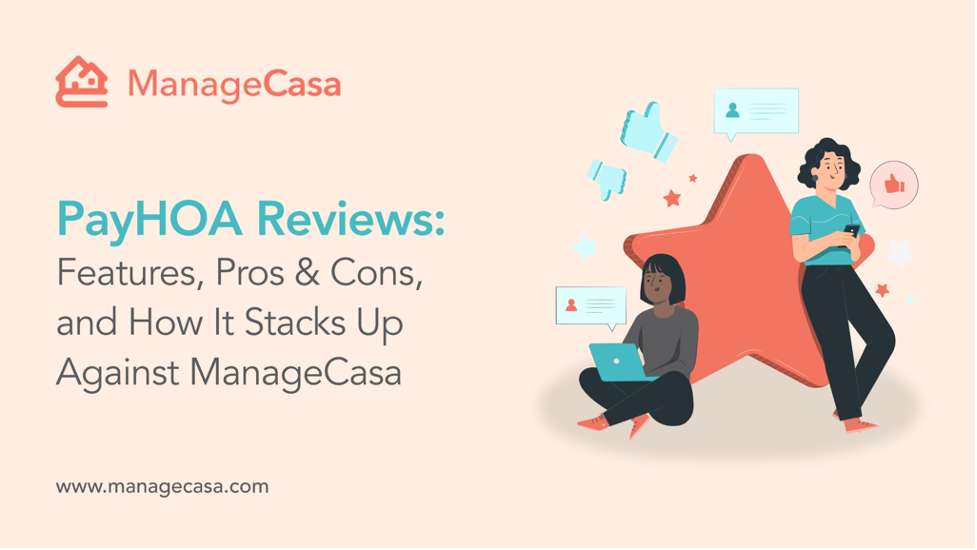The Best HOA Management Software in 2026: A Complete Guide for Community Managers
Let's be real — nobody joins an HOA board because they love chasing down late dues payments or spending their Sunday evening buried in a spreadsheet. Most board members are volunteers who genuinely care about their neighborhood. They want cleaner streets, well-maintained amenities, and a community their neighbors are proud to live in.
But somewhere between the good intentions and the actual work, the admin takes over.
That's the problem HOA management software was built to solve. The right platform handles the tedious stuff — payment collection, maintenance tracking, financial reporting, violation notices — so you can get back to what actually matters: running a great community.
In this guide, we'll walk you through everything you need to know about homeowners association management software in 2026: what it does, what to look for, and which platforms are actually worth your time. We'll also show you why ManageCasa has become the go-to choice for community managers who are done wrestling with outdated tools.
What Is HOA Management Software — and Do You Really Need It?
If your board is still managing dues through PayPal, tracking violations in a shared Google Doc, and emailing PDF newsletters to 200 homeowners — you need it.
HOA management software is essentially a command center for your community. It brings together every administrative task — payments, maintenance, communication, financials, documents — into one place that your whole board can access, from any device, at any time.
Think of it less like software and more like hiring a full-time admin assistant who never takes a day off, never loses a payment record, and sends violation notices without you having to ask.
According to the Community Associations Institute (CAI), there are over 365,000 community associations in the U.S., housing nearly 74 million Americans. And per HOA-USA, that number has grown by over 40% in the past two decades. Despite this growth, most boards are still running on tools that weren't designed for the job. The ones that have switched to dedicated HOA software wonder how they ever managed without it.
What to Look for in HOA Management Software
Not every platform is created equal, and the wrong choice can create more headaches than it solves. Here's what actually matters when you're evaluating your options:
1. Online Dues Collection That Just Works
This is non-negotiable. Your software should support ACH transfers, credit and debit card payments, and — most importantly — recurring auto-pay so residents can set it once and never think about it again. Automatic late-fee reminders are a bonus that pays for itself. The Consumer Financial Protection Bureau (CFPB) reminds us that HOA boards carry a real fiduciary duty to handle community funds responsibly. Automated, trackable payments aren't just convenient — they're good governance
2. A Resident Portal They'll Actually Use
The best HOA resident portal is one residents open voluntarily — not because they have to call the office. Look for a self-service portal where homeowners can pay dues, submit maintenance requests, download meeting minutes, and check their account balance at 11pm on a Tuesday without bothering anyone.
3. HOA Accounting Software That Keeps Your Board Out of Trouble
Finances are where a lot of boards get into hot water. Built-in HOA accounting software should give you real time balance sheets, income statements, and budget-vs-actual reports that are audit-ready at any time — not just when the annual meeting rolls around.
4. Maintenance Tracking That Closes the Loop
There's nothing more frustrating for a homeowner than submitting a maintenance request and hearing nothing back for three weeks. Good maintenance & work order management lets residents submit tickets with photos, get status updates, and actually see their issue get resolved. For managers, it means no more requests falling through the cracks.
5. Violation Tracking That's Fair and Documented
Enforcing community rules is sensitive work. Done poorly, it damages relationships and opens the board up to complaints. The right software creates a clear, documented paper trail — automated notices, response tracking, and a complete audit history — so every decision is defensible and consistent.
6. Communication Tools That Don't Rely on Email Chains
Whether it's a pool closure notice or an emergency water shutoff, your platform should let you reach every resident instantly — via email, SMS, or app notification. No more reply-all disasters.
7. Cloud-Based and Mobile-Ready
Board members and community managers shouldn't be tethered to a desk. The best HOA management software works just as well on a phone as it does on a desktop — available on the App Store and In Google Play 2026, if it's not mobile-friendly, it's not ready.
The Best HOA Management Software in 2026
There are a handful of solid platforms out there, but they're not all built the same. Here's an honest look at the top options.
.png?width=131&height=131&name=ManageCasa%20logo%202%20(1).png) 1. ManageCasa - Best Overall for HOAs and Residential Communities
1. ManageCasa - Best Overall for HOAs and Residential Communities
If you've been frustrated by clunky software that feels like it was designed in 2008, ManageCasa will feel like a breath of fresh air. It's a modern, all-in-one platform that was built with community managers and self managed HOAs in mind — not bolted together from a rental management tool as an afterthought.
What makes it stand out isn't just the feature list. It's the fact that a volunteer board member with zero technical experience can log in and actually figure it out. That matters more than people realize.
What you get with ManageCasa:
-
A full HOA accounting software suite with dashboards your whole board can understand
-
A clean HOA resident portal for dues, maintenance, and documents
-
Automated violation tracking with templated notices and a complete audit trail
-
Per-unit pricing starting from $1.00/unit/month for HOA/COA — so small communities pay proportionally less, not a flat fee that over-charges you for unused capacity
- Native AI on every plan — not gated behind a $400/month Premium tier like Buildium's full AI suite
It scales naturally — whether you're managing a 30-unit condo association or a 500-home master-planned community. Because you pay per unit, your costs scale with your portfolio rather than locking you into a fixed tier you may not fully use.
Best for: Self-managed HOAs, condo associations, residential community management companies, and anyone who's tired of overpaying for software that's harder to use than it should be.
Book a demo now and start your free trial today!
 2. Buildium
2. Buildium
Buildium has been around since 2004 and has a well-earned reputation in the industry. It's comprehensive, reliable, and handles large mixed portfolios well. If you're currently on Buildium and wincing at the invoice, it's worth checking out our ManageCasa vs Buildium breakdown.
Pros: Mature platform, deep feature set, strong integrations, trusted brand, AI features on all plans (basic on Essential, full suite on Premium), good for mixed portfolios
Cons: Flat monthly tiers start at $62 — expensive for very small HOAs, dated UI, steeper learning curve, full AI suite only on Premium tier ($400/mo)
Best for: Mid-to-large professional management companies handling mixed residential and HOA portfolios.
 3. AppFolio
3. AppFolio
AppFolio is powerful — genuinely impressive if you're running an enterprise-scale operation. It comes in three tiers (Core, Plus, Max), all quote-based with no published pricing. The 50-unit minimum on Core makes it a non-starter for smaller HOAs, and the learning curve assumes you have a dedicated onboarding team. That said, Realm-X AI is included from the Core plan upward — covering assistant features, messaging, and automation workflows on Plus and above.
Pros: AI-powered automation, robust reporting, strong mobile app, excellent for large portfolios
Cons: Minimum unit requirement (~50 units), high price point, overwhelming for small HOAs or new users
Best for: Large property management firms with 200+ units and dedicated ops teams.
 4. HOA Express
4. HOA Express
HOA Express is simple, affordable, and — notably — offers a free plan that most competitors don't. Paid tiers start at $15/month (Inform) and $21/month (Engage, billed yearly) for up to 25 households. The Engage plan includes basic online payment collection, blast emails, and communication tools. But if you need actual financial management, maintenance workflows, or violation tracking, you'll quickly hit its ceiling.
Pros: Free plan available, paid tiers from $15/month (Inform) to $21/month (Engage) for up to 25 households, easy to set up, online payment collection on Engage, good for basic community communication
Cons: No accounting tools, no violation tracking, no maintenance management, payment collection is basic (Engage only), pricing scales by household count so larger communities pay more, limited scalability beyond communications
Best for: Very small, low-complexity HOAs that primarily need a community webpage.
 5. Condo Control
5. Condo Control
Condo Control does some things really well — particularly amenity booking and resident communication for condo buildings. Pricing starts at $67.50/month for under 50 units (Self-Managed), with a Get Quote model above that threshold. It includes online payments, maintenance and violation tracking, and human support. But the interface has a steeper learning curve than newer platforms, and it's built so squarely around condo buildings that non-condo HOAs often find it a poor fit.
Pros: Strong amenity booking, online payments included, maintenance & violation tracking confirmed, human support on all plans, good condo-specific tools
Cons: Starts at $67.50/mo (more than ManageCasa for small HOAs, close to Buildium Essential), quote-based above 50 units, steeper learning curve, accounting less intuitive than newer platforms, not ideal for non-condo HOAs
Best for: Condo communities where amenity management is the top priority.
How We Evaluated These Platforms
Before diving into comparisons, here's exactly how we assessed each tool — so you know this isn't just a paid ranking.
We evaluated each platform across 6 criteria, weighted by what matters most to HOA boards and community managers:
| Criteria | Weight | What We Looked At |
| HOA-specific features | 30% |
Dues collection, violation tracking, resident portal, board tools |
| Ease of use | 25% |
Onboarding time, UI clarity, mobile experience |
| Pricing & value | 20% |
Cost per unit, flat vs. per-unit model, hidden fees |
| Accounting depth | 15% |
Reporting, audit readiness, budget tracking |
| Customer support | 10% |
Response time, onboarding help, knowledge base |
Ratings are based on a combination of platform testing, verified user reviews from G2, Capterra and GetApp.
Why ManageCasa Stands Apart
Most HOA software was built for property managers first and adapted for HOAs later. ManageCasa was designed the other way around — with community association management as its core use case. Here's what that means in practice:
-
Per-unit pricing vs Buildium's flat tiers — a 30-unit HOA pays ~$30/month on ManageCasa vs Buildium's $62 minimum. The crossover is around 60–80 units where Buildium's flat rate becomes competitive
-
AI included on every plan — Buildium's full AI suite requires Premium ($400/mo), AppFolio's Realm-X automation (Flows) requires Plus or above. ManageCasa's AI tools are available across plans without gating
- Built for volunteers — the interface is clean enough for a first-time board member to navigate without training
- HOA-first accounting — financial dashboards designed around association budgets, not rental income
-
All-in-one without the bloat — no modules to bolt on, no enterprise contracts, no surprise fees
-
Responsive support — real humans available when things go sideways, not just a help article
Competitors like Buildium and AppFolio are excellent tools — for large professional management companies with IT teams and big budgets. ManageCasa is excellent for everyone else.
Side-by-Side Feature Comparison
Sometimes you just want to see it all in one place. Here's how the top platforms stack up:
| Feature | ManageCasa | Buildium | AppFolio | HOA Express | Condo Control |
|---|---|---|---|---|---|
| Pricing Model | Per unit/month | Tiered subscription | Quote / contact sales | Flat monthly | Quote / contact sales |
| Best For | HOAs, condos, associations | HOAs & property management | Large portfolios | Small communities | Condo & larger associations |
| AI Tools | ✅ | ✅ | ✅ | ❌ | Limited / none |
| Accounting & Finance | ✅ | ✅ | ✅ | ❌ | ✅ |
| Owner/Resident Portal | ✅ | ✅ | ✅ | ✅ | ✅ |
| Online Payments | ✅ | ✅ | ✅ | ✅ | ✅ |
| Automations | ✅ | ✅ | ✅ | ❌ | ✅ |
| Violation Tracking | ✅ | ✅ | ✅ | ❌ | Limited |
| Maintenance / Work Orders | ✅ | ✅ | ✅ | ❌ | ✅ |
| Document Storage/Management | ✅ | ✅ | ✅ | ✅ | ✅ |
| Communication Tools (Email/SMS) | ✅ | ✅ | ✅ | ✅ | ✅ |
| Reporting & Analytics | ✅ | ✅ | ✅ | Limited | Moderate |
| Custom Branding | ✅ | ✅ | ✅ | ✅ | ✅ |
| Mobile App | ✅ | ✅ | ✅ | ❌ | ✅ |
| API / Developer Access | ✅ | ✅ | ✅ | ❌ | ✅ |
| Amenity / Booking Tools | ❌ | ❌ | ❌ | Limited | ✅ |
| Visitor/Access / Security Tools | ❌ | ❌ | Limited | ✅ | ✅ |
| Ease of Use | Moderate | Moderate | Steeper Learning | Very Easy | Moderate |
Let's Talk About Price
Pricing is where things get interesting — and where a lot of boards get caught off guard.
Most legacy platforms like Buildium and AppFolio charge per unit. That sounds reasonable at first, but it means every new property you add to your portfolio increases your monthly bill. For a growing management company, that adds up fast. According to Capterra, per-unit plans typically run $1–$3 per unit per month, plus base fees — easily $300–$500/month for a mid-size portfolio before you've added any paid add-ons.
ManageCasa charges per unit, every month — so what you pay scales directly with the size of your portfolio. For HOA management software covering small communities all the way up to large multi-association portfolios, that kind of transparent, proportional pricing means you're never overpaying for capacity you're not using. See exactly what you'd pay at ManageCasa pricing.
How to Pick the Right Platform Without Overthinking It
Here's a simple way to think about it:
-
Write down your three biggest pain points right now. Is it chasing dues? Losing track of maintenance requests? Board members arguing over spreadsheets? Your software should solve those first.
-
Be honest about your team's tech comfort level. A powerful platform nobody uses is worse than a simple one everyone adopts.
-
Check how pricing scales. Per-unit pricing is the standard — what matters is whether the rate is fair at your portfolio size. Run the numbers before you commit.
-
Make sure it works on mobile. You'll use it more than you think while you're on the go.
-
Use the free trial. Don't buy software based on a demo. Test it with your actual data
The Bottom Line
Your HOA board didn't sign up to be full-time administrators. You signed up because you care about your community. The right HOA management software gives you back the time and headspace to focus on that — while the platform quietly handles the paperwork in the background.
ManageCasa was built for exactly this. Modern design, powerful tools, transparent per-unit pricing — and a support team that actually picks up the phone. From HOA accounting software to your community needs in one place.
Give it a try — your future self will thank you.
Book a demo now and start your free trial today!
/Peter%20Koch-1.png?width=80&height=80&name=Peter%20Koch-1.png)
Peter Koch
CEO of ManageCasa
Peter Koch is an expert in property management and SaaS, focused on building top digital tools for property managers and growing technology-driven startups. He specializes in enhancing property management operations through smart software solutions that streamline accounting, automate workflows, and improve community communication. Peter writes about HOA management technology, proptech innovation, and scalable SaaS strategies designed to help modern property professionals operate more efficiently.
Frequently Asked Questions
For most self-managed HOAs and small-to-mid community management companies, ManageCasa is the standout choice — per-unit pricing that stays proportional, AI features across all plans, and an interface a volunteer board member can actually navigate without training.
It depends on the platform. Buildium charges flat monthly tiers: $62 (Essential), $192 (Growth), or $400 (Premium) — regardless of unit count. ManageCasa charges per unit: a 50-unit HOA pays around $50/month on the Base plan ($1.00/unit). For small communities, ManageCasa is almost always cheaper. The crossover is around 60–80 units where Buildium's flat rate starts to look competitive. Full details at ManageCasa pricing.
Absolutely. HOA management software for small communities doesn't have to mean limited features. ManageCasa was built to be accessible for communities of any size — and because it charges per unit, smaller communities automatically pay less without being locked into a plan built for a much larger operation.


